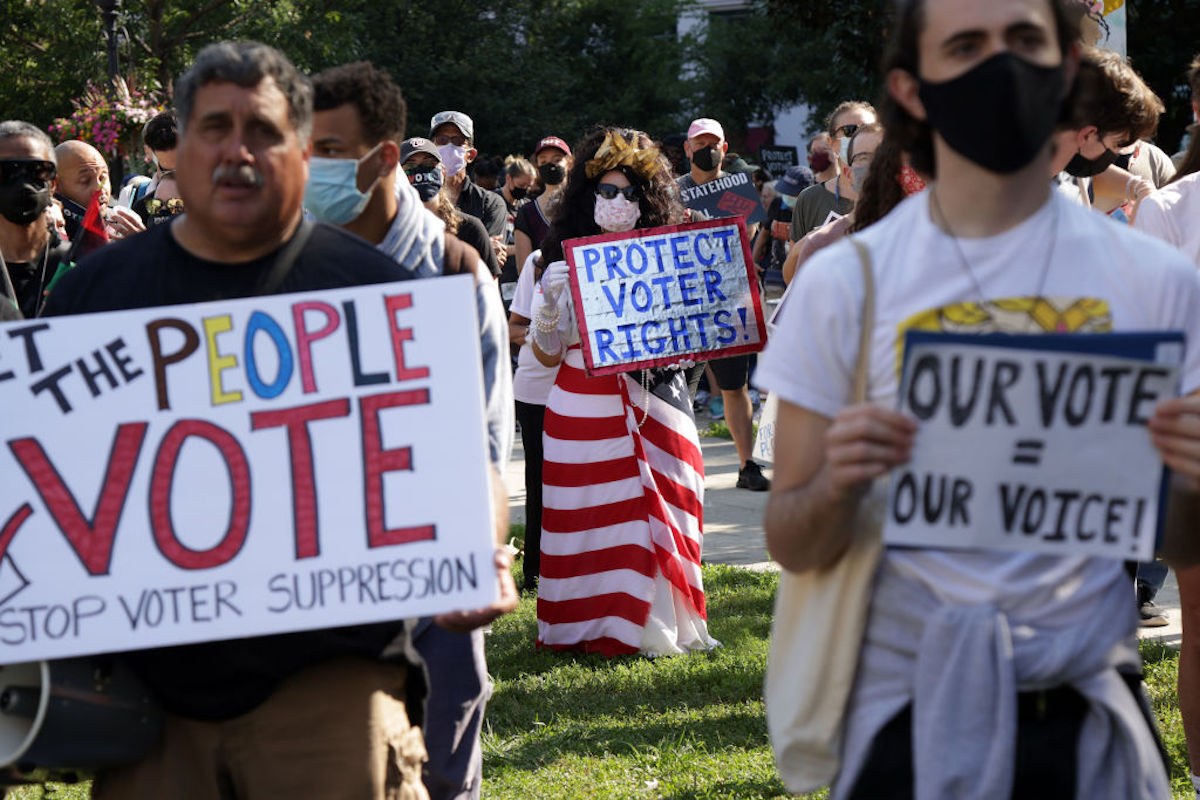Federal Judges Want To Make It Impossible for Individuals To Protect Their Own Voting Rights
Cheating is the goal.

Growing up, I learned in school that two of the most important achievements in modern political history were the Civil Rights Act and the Voting Rights Act. But as I have gotten older and started working in politics, I have seen firsthand that these protections are not guaranteed.
The Voting Rights Act in particular has been under attack basically since its passage in 1965, with efforts to disenfranchise voters becoming more brazen in a lot of ways since the Trump era. And they just got hit with another devastating blow.
Section 2 of the Voting Rights Act bans discriminatory voting practices or procedures and allows people, groups, or government entities to sue over perceived wrongdoings.
However, a Trump-appointed U.S. District Judge made a weird decision in 2022 that heavily restricted who could bring Section 2 Voting Rights Act lawsuits. He stated that only the U.S. Attorney General could bring these kinds of cases. That seems not great!
For one thing, this seems like it would leave a lot up to the whims of whoever is in office at the time, seeing as presidents nominate Attorneys General. Sure, they are supposed to just be arbiters of the law and not political actors, but we know that this is not always the case.
As the New York Times puts it, “Should the ruling stand, it would remove perhaps the most important facet of the Voting Rights Act; a majority of challenges to discriminatory laws and racial gerrymanders have come from private citizens and civil rights groups.”
This month, the 8th U.S. Circuit Court of Appeals upheld this ridiculous ruling in a 2-1 decision. Judge David Stras (a Trump appointee) wrote in the majority opinion: “For much of the last half-century, courts have assumed that [Section 2] is privately enforceable. A deeper look has revealed that this assumption rests on flimsy footing.”
That seems a bit vague and arbitrary. The lone dissenter, Judge Lavenski Smith, wrote in his opinion: “Until the [Supreme] Court rules or Congress amends the statute, I would follow existing precedent that permits citizens to seek a judicial remedy. Rights so foundational to self-government and citizenship should not depend solely on the discretion or availability of the government’s agents for protection.”
See, that makes sense!
This case is almost definitely going to wind up before the Supreme Court, which is a terrifying thought, considering its extreme conservative makeup.
Cheating is the goal
A huge ongoing fight in the battle for voting rights involves the drawing of maps that do not accurately represent constituents. I live in North Carolina and we have been at war for a while over the issues of drawing maps, gerrymandering, and voting rights at large. Having worked in politics, I know that there have been more registered Democrats in this state than Republicans. However, our state legislature has been largely red and we have even gone years with a supermajority in the state legislature, until recently. These kinds of discrepancies are the reason that the Voting Rights Act exists, and why it needs to be protected in its entirety.
This particular case involves the Arkansas State House Map. Republicans have been making a devastating impact on state and local politics. Arkansas’ NAACP helped lead a suit challenging the map, arguing that it dilutes the Black vote. (And remember, if the appeals court’s ruling stands, not only would the map be allowed to stay as is, but in the future, groups like the NAACP couldn’t even file this kind of suit—only the U.S. government could.)
NPR broke down the demographics of the state and it is just like what I described seeing in North Carolina every day. Arkansas’ population is around 16.5% Black. However, with the maps proposed by Republicans, just 11 of the 100 districts are majority-Black districts, “where Black voters have a reasonable chance of electing a representative of their choice.”
We know that no group is a monolith, but Black people very reliably vote for Democrats. If Republicans can shove the Black vote into fewer districts or cut through majority-Black areas to spread them out and dilute their voting power, there’s a greater likelihood that they limit the Democratic representatives that will be elected. Both parties have been guilty of doing this but Republicans truly have no shame around the practice, creating districts with no natural logic, that often look like Swiss cheese or stretched-out archipelagos.
Republicans know that the only way they can remain in power is to rig the game. The Arkansas case is just one example of how the courts are going to be involved in this fight for a long time to come.
(featured image: Alex Wong/Getty Images)
Have a tip we should know? tips@themarysue.com